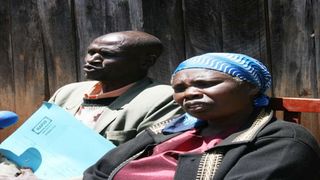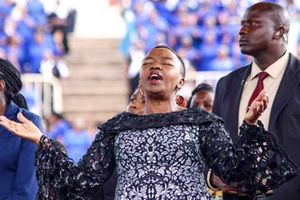
Bosire Bogonko's parents David and Esther at their home in Mungetho in Kuresoi North on March 10, 2014.
| Carol Chebet | Nation Media GroupNews
Premium
Bogonko’s dramatic entry into world of journalism
What you need to know:
- When Bogonko was five years old, he pointed to the front-page of a newspaper that his mother was reading and declared “I am going to be a writer of newspapers.”
Initially, the internship was for two weeks, but he ended up working for AFP for about 10 years, including reporting on South Sudan’s peace process.
In 2005, the world watched as the leaders of the Sudan People’s Liberation Movement/Army (SPLM/A) signed a comprehensive peace agreement with the government of Sudan. The deal, also known as the Naivasha peace agreement, was a precursor to the independence of South Sudan.
Many journalists covered the process but none was as relentless and committed as Bogonko Bosire. He became a common fixture in Naivasha during the negotiations, gaining the trust of the opposing sides to the extent that he would be among the first to get crucial information from either party.
In the second episode of Case Number Zero, an exclusive eight-part Nation Audio podcast series investigating the disappearance of the journalist and blogger in 2013, we delve into his mysterious world and find out what put him in the situation where he believed his life was in danger before he vanished.
When Bogonko was five years old, he pointed to the front-page of a newspaper that his mother was reading and declared “I am going to be a writer of newspapers.”
Childhood ambitions
Many children declare their aspirations at an early age but few of them stick to just one profession and even fewer achieve their childhood ambitions declared at such a young age. At first, his mother was dismissive of his ambition to become a journalist. Bogonko was determined. When he joined Nyansiongo High School, he lobbied the administration to start a school newspaper of which he was the editor.
His teachers were so impressed by his writing and work ethic that they encouraged his parents to support this ambition.
Upon completing his secondary education, Bogonko wondered how he would achieve this dream. Kuresoi, where he comes from is a tiny village.
In 1999, when Bogonko had finished high school, newspaper distributors sometimes forgot to deliver to Kuresoi. This was a huge problem for a budding journalist. Bogonko was hooked to newspapers, he could not live without them.
He left Kuresoi and secured a newspaper selling job in Molo town. He did this without his parents’ consent. His mother remembers searching for him and finding him in Molo town working as a newspaper vendor. His parents tried and failed to persuade him to return to Kuresoi.
Months later, Bogonko received an admission letter from Egerton University to study Information Technology. His father was elated by the news but Bogonko was not interested in the course. He was not interested in anything else but writing, specifically writing for international newspapers. His parents were frustrated.
The way the education system worked at the time was that you selected a couple of universities and selected a couple of courses and waited for an admission letter.
Basically, your fate was decided by this. Bogonko’s luck led him to IT. But, things never happened to him, he made things happen. He left for Nairobi. Once again, his parents were not aware of his whereabouts. According to his mother, he was gone for two weeks and then one day he showed up with an admission letter to the Kenya Institute of Mass Communication (KIMC) and asked them for tuition fees of Sh70,000.
What his parents did not know was that Bogonko spent those two weeks in the administration block of the Kenya Institute of Mass Communication, pestering Mr Richard Ndirangu and Mr David Kamau — who were in charge of the journalism and production departments — for admission. Mind you, at this point that year’s intake was over.
College education
His parents did not have the Sh70,000. This did not deter Bogonko. He asked them to give him whatever they could. They gave him Sh35,000 and that is all the parents paid for Bogonko’s tuition. For the rest of his time at KIMC, Bogonko did a lot of odd jobs, to pay for his college education.
At KIMC, Bogonko started the school magazine together with Dennis Onsarigo and Dennis Itumbi among others.
It was while in college that he started carrying his trademark messenger bags full of books. He always had a dictionary, a nonfiction book, a fiction book and several newspapers and magazines.
Bogonko’s dream metamorphosed in college. He still wanted to be a print journalist but for an international news agency. He wanted to write about African politics and how they affected the lives of millions of Africans. He wanted to be part of the select few who shape African narrative for the world.
Just like he pestered his way to an admission to KIMC, he relentlessly showed up at the Agence France Press (AFP) offices regularly until they gave him an internship.
Initially, the internship was for two weeks, but he ended up working for AFP for about 10 years, including reporting on South Sudan’s peace process.
In early 2012, Bogonko left the AFP. He established his Jackal News website a couple of months later.
His vision for the Jackal News, in his own words, was to “liberalise and democratise the media space.”
He was a pioneer in blogging, other than Kahawa Tungu which covered arts and culture, Jackal News became the go-to for alternative news. He was excited about the evolving technology in information dissemination and was keen to be a player in that sphere.
Continues next week.
#Case Number Zero is an eight-part weekly investigative podcast series. Press play at www.nation.africa/audio to listen to Episode 2





